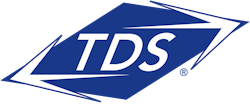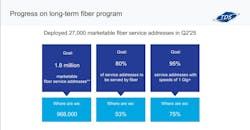TDS Telecom nears its 1.8M fiber service location target in Q2
Keep up to date with Lightwave’s earnings coverage.
You can check in our publication’s key segments:
And
Also, here's coverage of other key stories on TDS Telecom:
· TDS Telecom says it’s on track to equip 150K locations with fiber in 2025
· TDS Telecom increases spending to support fiber expansion opportunities
As TDS Telecom transforms itself into a fiber-centric broadband provider, the service provider is confident it can meet its ambitious targets to get service to as many homes as it can.
Speaking to investors during its second-quarter earnings call, Kris Bothfeld, VP and CFO of TDS Telecom, said that it is on track with its fiber expansion effort to have nearly 2 million marketable fiber addresses. As of the end of the second quarter, TDS had 968,000.
TDS is targeting 80% of total addresses to be served by fiber and ended the quarter at 53%.
“We've added 41,000 addresses through the second quarter and plan to hit 150,000 new fiber addresses this year as we continue to increase the number of construction crews,” she said. “We are also on track to hit an exciting milestone in the back half of the year, 1 million marketable fiber service addresses.”
As TDS expands broadband availability via fiber and coax, the service provider expects to offer 1 Gbps speeds to at least 95% of its footprint. It ended the quarter with 75% on gigabit speeds.
Bothfeld said its “goal is to reduce the number of addresses served by copper to less than 5% over time.”
Fiber drives broadband growth
Fiber continues to be a key part of TDS Telecom’s broadband growth engine, a factor that played out again during the second quarter.
During the quarter, TDS Telecom added 27,000 marketable fiber service addresses and 3,900 residential broadband net additions. TDS also added 10,300 residential broadband net adds from fiber markets.
Broadband connections in TDS Telecom’s markets have nearly doubled over the past three years due to the telco’s expansion efforts and the ongoing conversion of copper customers to fiber products in its incumbent markets.
“As we invest in fiber, we expect residential broadband connection growth to continue,” Bothfeld said. “We delivered 10,300 this quarter, comparable to the same period last year, and grew total service addresses 5% year over year.”
Unsurprisingly, as TDS brings fiber into more markets, it is seeing growing demand for higher broadband speeds. As of the end of the quarter, 83% of its residential broadband customers took 100 Mbps, and 26% took 1 Gbps or higher.
Bothfeld noted that new customers that we added in the quarter, 56% took speeds of one gig or higher,” illustrating that the demand for faster speeds remained strong.”
TDS also saw broadband ARPU rise 1% year over year. Bothfeld said, “We expect more modest growth in residential revenue per connection this year as we focus on driving penetration.”
A large portion of TDS Telecom’s full-year capital expenditure will be to fulfill its fiber ambitions. “We expect both CapEx and service address delivery to continue to increase in the back half of the year as we accelerate construction to deliver 150,000 new fiber service addresses in 2025,” Bothfeld said. “Over 80% of our full-year capital expenditures will be focused on fiber.”
E-ACAM rural engine
Another key element of TDS Telecom’s fiber broadband expansion effort will be fueled by its involvement in the FCC’s Enhanced ACAM (E-ACAM) program.
The E-ACAM program will distribute roughly $18.28 billion over 15 years to carriers to deploy broadband service with speeds of at least 100 megabits per second downstream and 20 megabits per second upstream (100/20 Mbps) to more than 700,000 locations, and to improve or maintain 100/20 Mbps broadband service at approximately 2 million locations, in 44 states.
Eligible E-ACAM areas are in approximately 30% of its ILEC footprint. The service provider expects 65%-75% penetration in EACAM-eligible areas.
TDS Telecom expects E-ACAM to contribute about 300,000 additional addresses to its fiber footprint. “As our EACAM build continues to ramp over the second half of the year, we expect service address growth and fiber net adds to follow,” Bothfeld said.
Revenue shifts
From a revenue standpoint, TDS Telecom reported total operating revenues of $265 million.
The company’s results were slightly impacted by the sale of its Colorado ILEC market on June 2 and the pending sale of our ILEC companies in Oklahoma.
TDS updated the ranges for revenue, adjusted EBITDA, and adjusted OIBDA to reflect the divestiture of our Oklahoma ILEC market, which was not included in its previous guidance, as well as ongoing declines in our cable and copper markets.
“Although these transactions impact short-term results, they're a key part of our strategy to optimize our portfolio and exit copper markets where there is not an economic path to fiber,” Bothfeld said.
Looking forward, TDS is projecting 2025 revenues to be in the range of $1.03 to $1.05 billion while adjusted EBITDA is expected to be $320 million to $350 million. Adjusted OIBDA is expected to be $310 to $340 million, and its capital expenditure guidance remains unchanged.
For related articles, visit the Business Topic Center.
For more information on high-speed transmission systems and suppliers, visit the Lightwave Buyer’s Guide.
To stay abreast of fiber network deployments, subscribe to Lightwave’s Service Providers and Datacom/Data Center newsletters.
About the Author
Sean Buckley
Sean is responsible for establishing and executing the editorial strategy of Lightwave across its website, email newsletters, events, and other information products.



